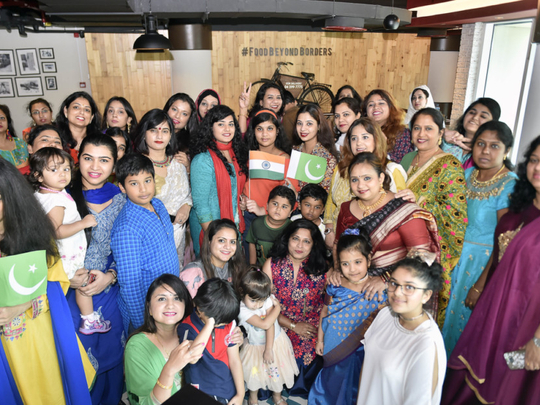
Dubai: People across the world know India and Pakistan as bitter rivals, but when people from these two countries meet at personal level, most often they become best of friends.
With a common heritage and similarities in food, language, culture, music, and attire to name a few, for many Indo-Pak friends there are more reasons to love than hate.
Politics often keeps the citizens of both countries apart, giving them fewer opportunities to understand each other, but when they come together, it is hard to differentiate between the two.
With so many Indian and Pakistanis calling the UAE their second home, this seems to be the ideal place to find friends whom no border can keep apart and Friendship Beyond Borders (FBB) is a cultural platform that is trying to tap into this bond, furthering the understanding and love between the people from India and Pakistan.
Pakistani sisters Farzeen and Mariam Ashraf, both born and brought up in the UAE, studied in an Indian school in Abu Dhabi and spend more time with their Indian friends than their compatriots.
“We spend most of our time with our Indian friends, in fact, we have very few Pakistani friends. When we hang out together it hardly occurs to us that there are any differences and that we are from two different countries. We feel as comfortable among them as we feel with our family,” said Mariam Ashraf, a grade 11 student.
Her elder sister Farzeen, who is a business graduate from Dukes University, said that she sees no reason for people from the two countries to hate each other or fight.
“There is so much common that it is hard to differentiate. Both the countries have people from different religions like Hindus, Muslims, Sikhs and Christians, and both the countries also have regional identities like Punjabis, Sindhis, Pathans, Bengalis. In fact, in Karachi we have people who migrated from all parts of India,” said Farzeen, whose parents and grand parents migrated to Karachi from India during Partition.
Mariam and Farzeen have never been to India, but hope that they will be able to visit their ancestral lands in Bareilly and Delhi soon and relive the memories of their forefathers.
“Our maternal grand parents migrated from Bareilly in Uttar Pradesh and my father is from Delhi. More than 70 per cent people in Karachi are migrants from India and they are still attached to the memories of their forefathers. In fact, when marriage ties are forged the background of the families and their ancestry still matter,” added Farzeen.
Stories of strong personal friendships between Indians and Pakistanis are plenty, mostly forged in foreign countries like the UAE, UK and the US where the expatriates of both the countries find themselves working, studying or living together.
One such story is that of Stuti Khanna and Zeba Fareed, who though have a generation gap but have become the best of friends.
“I met Zeba five years back when her family came to live in our building in Fujairah. Our husbands work for the same firm and this meant that we had to socialise with each other often. But now we are a family. She is like a mother to me and my son spends more time with her than he does at home,” said Khanna, who is from Mumbai, but grew up in the Indian border town of Ferozepur and has her ancestry on the other side of the border.
Khanna says that, before coming to the UAE five years back, she had heard a lot of different things about Pakistanis, but after coming here she has better understood them.
“Only when I met people from Pakistan I could understand that they are just like us, with same values, same languages, same habits, same problems. There is hardly anything different. All these differences that are spoken about are just politics and nothing else,” said Khanna.
Khanna’s parents and grandparents hail from Kasur and Lahore in Pakistan and the 32-year-old housewife hopes that soon she would be able to take them back to the cities of their birth.
“My grandparents keep talking about Kasur, Lahore and Multan, especially Lahore. There is saying in Punjabi that those who haven’t seen Lahore, haven’t seen anything. I have heard that Lahore is beautiful city and it is where my ancestors grew up, so I wish that the political situation between the two countries improve and we could all visit Lahore soon,” said Khanna.
With so much in common many friends from beyond the border wonder why Partition happened.
Partition of the subcontinent happened in 1947, when the British colonial rule ended, creating two distinct political entities of India and Pakistan.
Now in its second season, FBB celebrates the commonalities and similarities between the two cultures, in daylong events for women from both the countries. The programme happens in the lead up to the independence days of Pakistan and India, which fall on August 14 and 15 respectively.
This year the event was held on Sunday, August 12, at Sthan Restaurant, a venue that is built on the theme of food beyond borders, celebrating the cuisines of Hindustan, Pakistan and Afghanistan.




